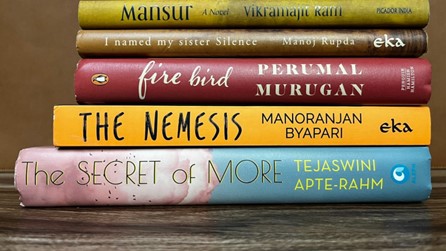The shortlist for the highly anticipated 2023 JCB Prize for Literature was unveiled on Friday, highlighting a diverse array of literary talent from different languages. Manoranjan Byapari and Perumal Murugan, both seasoned authors, find themselves shortlisted for the third time, attesting to the enduring power of their storytelling. A notable twist this year is Hansda Sowvendra Shekhar, previously shortlisted as an author, who now makes the cut as a translator, offering a fresh perspective on the literary landscape. The shortlist also welcomes newcomers Vikramajit Ram, Tejaswini Apte-Rahm, and Hindi language writer Manoj Rupda, marking a dynamic shift in the roster of literary excellence.
The eagerly awaited winner of this prestigious award will be announced on November 17, with the victorious author receiving a substantial cash prize of Rs 25 lakh. If a translation is part of the winning entry, the translator will be rewarded with Rs 10 lakh.
Here is a glimpse of the shortlisted titles, accompanied by excerpts from reviews featured on Scroll:
1."The Nemesis" by Manoranjan Byapari, translated from the Bengali by V Ramaswamy
"The Nemesis" delves into the profound journey of Jibon, a man driven by an all-consuming purpose. His relentless pursuit is bound to challenge the deeply ingrained caste-based societal norms. In this third and final book of the trilogy, Manoranjan Byapari's writing radiates raw passion, while V Ramaswamy's empathetic translation preserves the essence of Bengali culture and geography, challenging the notion of a casteless Bengal.
2."Fire Bird" by Perumal Murugan, translated from the Tamil by Janani Kannan
"Fire Bird" transcends the boundaries of land as a mere source of life and death, unravelling intricate stories of belonging and longing. Perumal Murugan weaves an enchanting narrative, where farming serves as the focal point for exploring the intertwined relationships between people and their land. The novel, characterized by its narrative complexity, reminds us of the inherent instability of our footing in this world.
3."I Named My Sister Silence" by Manoj Rupda, translated from the Hindi by Hansda Sowvendra Shekhar
"I Named My Sister Silence" embarks on a non-linear journey across multiple timelines, transcending the conventional coming-of-age narrative. The unnamed Adivasi narrator's odyssey, marked by a significant childhood incident, is a testament to how power structures shape the archive of history. Rather than attempting to fill gaps, the novel poses thought-provoking questions, inviting readers to question the forces that dictate what is included and excluded from the archive.
4."Mansur" by Vikramajit Ram
"Mansur" immerses readers in a world defined by beauty, not opulence. Vikramajit Ram manages this realm of wealth and artistic pursuit with exquisite tenderness, revealing a legacy of aesthetics within the empire. The novel is a rich tapestry of beauty and desire, inviting readers to savour its pages, much like precious silk, demanding both attention and restraint.
5."The Secret of More" by Tejaswini Apte-Rahm
"The Secret of More" artfully weaves a narrative that dances through time, resembling the patchwork of memory. Characters, complex and complete, navigate the intricate web of love, fear, and hope. Tejaswini Apte-Rahm's storytelling prowess shines as she vividly describes places and eras long past, bringing the reader into a world of vivid historical detail and evocative imagery.
The 2023 JCB Prize for Literature shortlist promises an eclectic mix of languages, narratives, and perspectives, making it a captivating literary journey for all enthusiasts.






